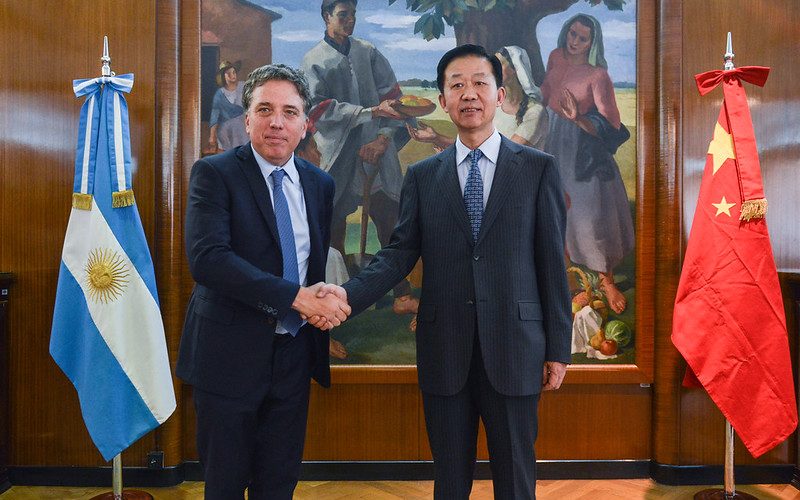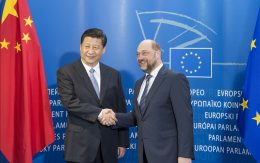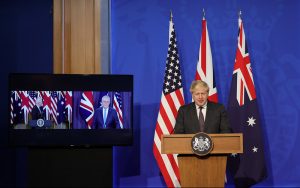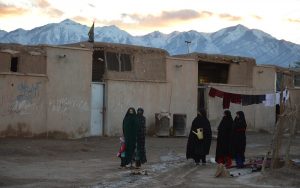As of 2010, Argentina became one of the main exporting countries of soybean oil and flour¹. Since then, its commercial ties with China have multiplied: in 2014, the Latin American country gave China a significant part of its land to build a Space Station and, a year earlier, the Argentinian state paid a billion dollars for Chinese wagons. Currently, the Asian country is targeting the Paraná River waterway, the installation of hog farms and hydroelectric power plants in Patagonia.
Although the talks on the Chinese space base in Argentina began in 2010, the agreement was only signed in 2014.
With 50 years of validity agreed between the parties, this agreement allowed the Chinese government to build a Deep Space Station in a territory of 200 hectares ceded by the Argentine Nation, with apparently nothing in return. In this cooperation agreement, Argentina also authorized the construction of a 35-meter-high antenna and granted a total tax exemption to all related activities. Additionally, they committed not to “interfere with or interrupt the normal activities carried out by the Cooperation Agreement”². This last rule is fully obeyed since Argentinian citizens are not allowed to enter the so-called “Chinese base” and no recent photographs of it are found on the internet³.
The Chinese Deep Space Station continues to be a mystery. In 2015, Jorge Lanata, on his journalistic investigative television show, revealed that there are several secret clauses in the Cooperation Agreement mentioned above and that, when he and his team asked for permission to enter the Space Station, the Chinese Embassy denied their entrance. Lanata also pointed out the Chinese government claims it is used only for civil activities, yet the place is run by a senior military official⁴.
Another deal between both countries consisted in the purchase of train cars. China gave Argentina a loan of US $2,7 billion and consequently, the then president of Argentina, Cristina Fernández de Kirchner, decreed a direct buying from the Chinese state firm CSR Sifan for almost US $1 billion, which represented 25% of the state railway company’s annual billing⁵. This came after four rail accidents between 2011 and 2013 took the lives of 66 citizens and injured more than 1,400 people. A journalistic investigation revealed serious overpricing in the acquisition of these wagons and led to an ongoing investigation by the federal justice⁶.
More low-profile, high-impact negotiations are taking place: the establishment of Chinese pig farms, the concession of one of the world’s most important waterways, and hydroelectric power plants.
China’s plan to finance intensive pork production in Argentina is rejected by animal protectionist associations and by scholars of zoonotic diseases. Last September, environmentalists organized a self-convened public hearing due to the lack of transparency about this specific negotiation⁷.
The ministry of foreign affairs later stated the deal failed, but, although there will not be a deal between the two countries, there could be one between each Argentine province and China. That is the case of the province of Chaco, where Governor Jorge Capitanich signed a cooperation agreement with the Chinese Argentinian company Feng Tian Food to set up three factories there⁸. One of the farms is allegedly going to be installed in El Espinillo, a town where the residing Qom population has not been asked about this matter. Once again, locals are concerned about the absence of official information. The only details known were disclosed by the mayor, Zenón Cuellar, who told the local radio station the plan would bring ‘Chinese investments’ for ’20 years’⁹.
Moreover, residents and NGOs are worried about land clearance since this region is known for its tropical forests where the Tobas people live. If Chaco and China reach more agreements, they would need to cut down thousands of hectares and that would violate the Native Forests Law¹⁰. This wouldn’t surprise locals, considering that since the bill passed in 2007, 390.668 hectares have been illegally cleared in Chaco¹¹.
Governor Capitanich defended the deal by claiming it would create 1,080 jobs¹². While adding that a number of jobs sounds positive, the negative consequences are clearing land, displacing ethnic groups from their territory and worsening floods in one of the poorest provinces of the country¹³.
In the matter of the Paraná River waterway, the Argentine State did not renew Belgian company Jan De Nul’s 35-year-old concession and was about to give it to the Chinese Shanghai Dredging, a state subsidiary of China Communications Construction Company with ties to the Chinese military power. According to Wall Street Journal, former US Secretary of State, Mike Pompeo, accused CCCC of predacious financing, corruption, and environmental endangerment in projects that took place in Asia, Latin America, and Africa¹⁴. When unions, environmental activists and exporting companies protested this concession¹⁵, Argentina backed down and proceeded to nationalize the waterway for 1 year. This April, the Chinese company Shanghai Dredging Co. announced its intentions to win the following tender.
China’s other significant plan consists of the construction of the Cóndor Cliff-La Barrancosa hydroelectric plants. According to the World Wildlife Fund, this project could flood the Perito Moreno glacier and destroy one of the most attractive sites for tourists from all over the world. In addition, it could potentially erase most marine wildlife and ruin El Calafate’s untamed landscape¹⁶, which is the reason it’s one of the most visited places in the country.
In 2014, Argentina got a loan from the Industrial and Commercial Bank of China (ICBC), Bank of China Limited (BOC) and China Development Bank Corporation (CDB) for USD 4,714 million¹⁷. Originally, the plants were supposed to be ready by 2019, but in Macri’s administration between 2015 and 2019 the construction was almost paralyzed. Last June, the Chinese government stopped sending money to continue with the building of the hydroelectric plants after Argentina failed to make the first repayment of the USD 4,714 million. Instead, Gezhouba, the company in charge, asked the Argentine state for USD 180 million to move forward with the project¹⁸. Last August, despite paying that amount seemed impossible for Argentina since it has debts for 101.5% of its GDP¹⁹, the executive branch signed an order to pay what the Chinese government wanted²⁰.
It is still uncertain why they chose to build hydroelectric plants that give power to 700,000 families in such an uninhabited region and 2,400 km away from the main industrial complexes ²¹. It is also not clear how the Chinese Deep Space Station benefits Argentina and why its citizens can’t access a part of their own territory.
Overall, it remains to be seen how all these deals truly benefit the Latin American republic. However, one thing is for sure, China is gently approaching Argentina, a country in deep debt.
Sources ¹ Smink, V. (2010). Cosecha récord de soja para Argentina. [online] BBC News Mundo. Available at: https://www.bbc.com/mundo/economia/2010/06/100618_2343_argentina_cosecha_soja_lav [Accessed 1 Oct. 2021]. ² Cooperation agreement between the government of the Argentine republic and the government of the People’s Republic of China on the construction, establishment, and operation of a deep space station of China in the Province of Neuquén, Argentina, within the framework of the Chinese moon exploration program. [online] Available at: http://servicios.infoleg.gob.ar/infolegInternet/anexos/240000-244999/243830/ley27123.pdf [Accessed 1 Oct. 2021]. ³ Pérez, C. (2016). Lo que se sabe de la misteriosa base que China está construyendo en la Patagonia argentina. [online] BBC News. Available at: https://www.bbc.com/mundo/noticias/2016/03/160317_misteriosa_base_china_patagonia_argentina_lb [Accessed 1 Oct. 2021]. ⁴ Periodismo Para Todos, (2015). eltrece. 15 Jun. Available at: https://www.youtube.com/watch?v=f-jodVgOy-U [Accessed 1 Oct. 2021]. ⁵ Lukin, T. (2013). Los trenes que se vienen desde China. [online] Pagina/12. Available at: https://www.pagina12.com.ar/diario/economia/2-229609-2013-09-23.html [Accessed 1 Oct. 2021]. ⁶ Santoro, D. (2017). Investigan si Randazzo pagó sobreprecios en la compra de trenes. [online] Clarín. Available at: https://www.clarin.com/politica/investigan-randazzo-pago-sobreprecios-compra-trenes_0_r1EgkiWol.html [Accessed 1 Oct. 2021]. ⁷ Martínez, C.R. (2021). Acuerdo porcino con China: cientos de personas participaron en una audiencia pública autoconvocada. [online] elDiarioAR.com. Available at: https://www.eldiarioar.com/sociedad/medio-ambiente/acuerdo-porcino-china-cientos-personas-participaron-audiencia-publica-autoconvocada_1_8312717.html [Accessed 1 Oct. 2021]. ⁸ Dinatale, M. (2021). Granjas porcinas: China acordó con Chaco el desarrollo de la producción a gran escala. [online] El Cronista. Available at: https://www.cronista.com/economia-politica/granjas-porcinas-china-acordo-con-chaco-en-el-desarrollo-de-la-produccion-a-gran-escala/ [Accessed 1 Oct. 2021]. ⁹ Castilla, M. and Fernández Bravo, E. (2021). Cerdos en el Chaco: las nuevas inversiones que ponen en peligro el territorio indígena qom. [online] Noticias ambientales. Available at: https://es.mongabay.com/2021/08/cerdos-en-el-chaco-inversiones-chinas-territorio-indigena-qom-argentina/ [Accessed 1 Oct. 2021]. ¹⁰ Native Forest Law. [online] Available at: http://servicios.infoleg.gob.ar/infolegInternet/anexos/135000-139999/136125/norma.htm [Accessed 1 Oct. 2021]. ¹¹ Colombo, L. (2021). Carta de Greenpeace la gobernador de Chaco, Jorge Capitanich, por violación de la Ley de Bosques. [online] Greenpeace Argentina. Available at: https://www.greenpeace.org/argentina/story/issues/bosques/carta-de-greenpeace-la-gobernador-de-chaco-jorge-capitanich-por-violacion-de-la-ley-de-bosques/ [Accessed 1 Oct. 2021]. ¹² Quaizel, G. (2021). Chaco cerró un acuerdo porcino con China y en agosto concretará las primeras exportaciones. [online] Noticias Agropecuarias. Available at: https://www.noticiasagropecuarias.com/2021/08/03/chaco-concreto-un-acuerdo-porcinos-con-china-y-en-agosto-concretara-las-primeras-exportaciones/ [Accessed 1 Oct. 2021]. ¹³ National Institute of Statistics and Censuses of the Argentine Republic (INDEC) (2021). Poverty and indigence in 31 urban areas. [online] indec.com. Available at: https://www.indec.gob.ar/uploads/informesdeprensa/eph_pobreza_09_21324DD61468.pdf [Accessed 1 Oct. 2021]. ¹⁴ O’Keeffe, K., and Wong, C.H. (2020). U.S. Sanctions Chinese Firms and Executives Active in Contested South China Sea. Wall Street Journal. [online] 27 Aug. Available at: https://www.wsj.com/articles/u-s-imposes-visa-export-restrictions-on-chinese-firms-and-executives-active-in-contested-south-china-sea-11598446551 [Accessed 1 Oct. 2021]. ¹⁵ Fabricio Navone (2020). Gremios y empresas resisten el desembarco de China en la Hidrovía. [online] La Política Online. Available at: https://www.lapoliticaonline.com.ar/nota/130357-gremios-y-empresas-resisten-el-desembarco-de-china-en-la-hidrovia/ [Accessed 1 Oct. 2021]. ¹⁶ World Wildlife Fund. (2019). Represas amenazan al río Santa Cruz y al glaciar Perito Moreno. [online] Available at: https://www.worldwildlife.org/descubre-wwf/historias/la-planeacion-de-mega-represas-en-argentina-amenazan-al-rio-santa-cruz-la-vida-silvestre-los-medios-de-subsistencia-y-al-glaciar-perito-moreno [Accessed 1 Oct. 2021]. ¹⁷ Pagina/12. (2014). Una misión a China por las represas. [online] Available at: https://www.pagina12.com.ar/diario/elpais/1-254112-2014-08-30.html [Accessed 2 Oct. 2021]. ¹⁸ Lapoliticaonline.com.ar. (2021). China se enoja porque no avanzan las represas y frena financiamiento a trenes. [online] Available at: https://www.lapoliticaonline.com.ar/nota/135227-china-se-enoja-porque-no-avanzan-las-represas-y-frena-financiamiento-a-trenes/ [Accessed 2 Oct. 2021]. ¹⁹ Gobierno de la República Argentina (2021). Evolución de la Deuda Bruta de la Administración Central. [online] argentina.gob.ar. Available at: https://www.argentina.gob.ar/economia/finanzas/presentaciongraficadeudapublica [Accessed 1 Oct. 2021]. ²⁰ Redacción EconoJournal (2021). Confirmado: aprueban un salvataje por casi $18.000 millones para las represas de Santa Cruz. EconoJournal. [online] 10 Aug. Available at: https://econojournal.com.ar/2021/08/confirmado-aprueban-un-salvataje-por-casi-18-000-millones-para-las-represas-de-santa-cruz/ [Accessed 1 Oct. 2021]. ²¹ Diamante, S. (2019). Represas Patagónicas. Avanza la obra más cara y polémica de las últimas décadas. La Nación. [online] 21 Feb. Available at: https://www.lanacion.com.ar/economia/tras-anos-inactividad-avanza-construccion-polemicas-represas-nid2221953/ [Accessed 1 Oct. 2021].








Be First to Comment